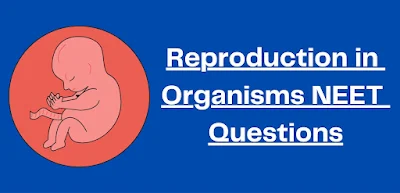Reproduction in Organisms Class 12 NEET MCQ :
NEET Questions on Reproduction in Organisms :
1. The continuity of life is maintained by the process of_____
(1) Respiration
(2) Reproduction
(3) Photosynthesis
(4) Adaptation
Answer: 2
Read: Reproductive Health MCQ
2. The offspring produced through which of the following process is not exactly similar to their parents?
(1) Asexual reproduction
(2) Sexual reproduction
(3) Parthenogenesis
(4) Ameiotic thelytoky
Answer: 2
3. Cell division is itself a mode of reproduction in:-
(1) Protista & all fungi
(2) Protista only
(3) Monera fungi & higher plants
(4) Protista & Monera
Answer: 4
Read: Reproduction in lower and Higher Plants
4. Most common special asexual reproductive structure seen in members of algae is:-
(1) Zoospore
(2) Conidia
(3) Sporangia spore
(4) Gemmule
Answer: 1
5. Short horizontal branch which is one internode long and produces a cluster of leaves above and a cluster of roots below is called:-
(1) Staton
(2) Offset
(3) Rhizome
(4) Bulbil
Answer: 2
Read: Human Reproduction NEET Questions
6. Find out the incorrect statement:-
(1) Period from birth to natural death is called life span
(2) Life span of an organism is necessarily correlated with their size
(3) Except for single-celled organisms all others are mortal
(4) Reproduction enable the species generation after generation
Answer: 2
7. Regarding the reproduction which of the following statement is correct:-
(1) Asexual reproduction is common among multicellular plants & animals
(2) In monerans cell division itself is a mode of reproduction
(3) Yeast undergo equal type cell division to produce bud
(4) In fungi fission is the most common method of asexual reproduction
Answer: 2
Read: Human Health and Disease NEET Questions
8. Reproduction is essential for______
(1) Producing young ones
(2) Adaptations
(3) Variations
(4) Continuity of a species
Answer: 4
9. Estrus cycle is found in______
(1) Gibbon
(2) Gorilla
(3) Cow
(4) Monkey
Answer: 3
Read: Diversity in Living World NEET Questions
10. Read the following four statements (A-D)______
(A) In asexual reproduction, offspring produced with or without the involvement of gametes
(B) In asexual reproduction, clones are formed
(C) Asexual reproduction is very common in single-celled organisms
(D) Budding in Hydra is a mode of sexual reproduction
How many of the above statements are correct
(1) Four
(2) Three
(3) Two
(4) One
Answer: 2
Read: MCQ on Cell
11. Meiocytes are______
(1) Spermatids
(2) Gamete mother cells
(3) Bone marrow cells
(4) Oocytes
Answer: 2
12. Which of the following animal is bisexual?
(1) Cockroach
(2) Leech
(3) Monkey
(4) Honey bee
Answer: 2
13. External fertilisation occurs in________
(1) Mammals
(2) Birds
(3) Reptiles
(4) Bony fishes
Answer: 4
14. Which one has the most chromosome number in meiocytes as compared to others?
(1) Cat
(2) Dog
(3) Rat
(4) Fruitfly
Answer: 2
15. Which of the following event is a post-fertilization event?
(1) Gametogenesis
(2) Gamete transfer
(3) Fertilisation
(4) Embryogenesis
Answer: 4
16. Which of the following organism has the longest life span?
(1) Elephant
(2) Horse
(3) Crocodile
(4) Parrot
Answer: 4
17. Which of the following animals are seasonal breeders?
(1) Monkey
(2) Human
(3) Bird
(4) Apes
Answer: 3
18. The process that refers to the development of the embryo is known as______
(1) Gametogenesis
(2) Embryogenesis
(3) Parthenogenesis
(4) Oogenesis
Answer: 2
19. Which of the following statement incorrect?
(1) Asexual reproduction is a rapid mode of reproduction.
(2) Embryogenesis involves cell division and cell differentiation.
(3) The life spans of organisms correlated with their sizes.
(4) Animals are either unisexual or bisexual.
Answer: 3
20. Arrange these animals in the increasing order of their life span_______
Crow, Horse, Parrot, Elephant
(1) Horse, Parrot, Crow, Elephant
(2) Crow, Parrot, Horse, Elephant
(3) Crow, Parrot, Elephant, Horse
(4) Crow, Horse, Elephant, Parrot
Answer: 4
21. Water hyacinth or Eichhornia is one of the problematic weeds of static water in India. Which of the following statement is incorrect about it:-
(1) It is also known as 'Terror of Bengal'
(2) It is a native plant of India
(3) It increases biological oxygen demand of water body
(4) It spread rapidly through vegetative reproduction.
Answer: 2
22. Select the odd one out concerning life span
(1) Life span of an organism are not correlated with their size
(2) Crows and parrots show the wide difference in their life span
(3) Life span of rice is 3-4 weeks
(4) It is the period between birth and the natural death of an organism.
Answer: 3
23. Write down the name of fleshy bud that produces new plant in Agave
(1) Bulbil
(2) Bulb
(3) Rhizome
(4) Offset
Answer: 1
24. The fleshy bud which produces new plants in hydrophytes is known as
(1) Bulbil
(2) Sucker
(3) Turion
(4) Runner
Answer: 3
25. Select the incorrect match:-
(1) Asexual reproduction - Somatogenic reproduction
(2) Sexual reproduction - Fusion of gametes
(3) Vegetative propagation - Rhizome
(4) Clone - Morphologically similar, genetically
dissimilar
Answer: 4
